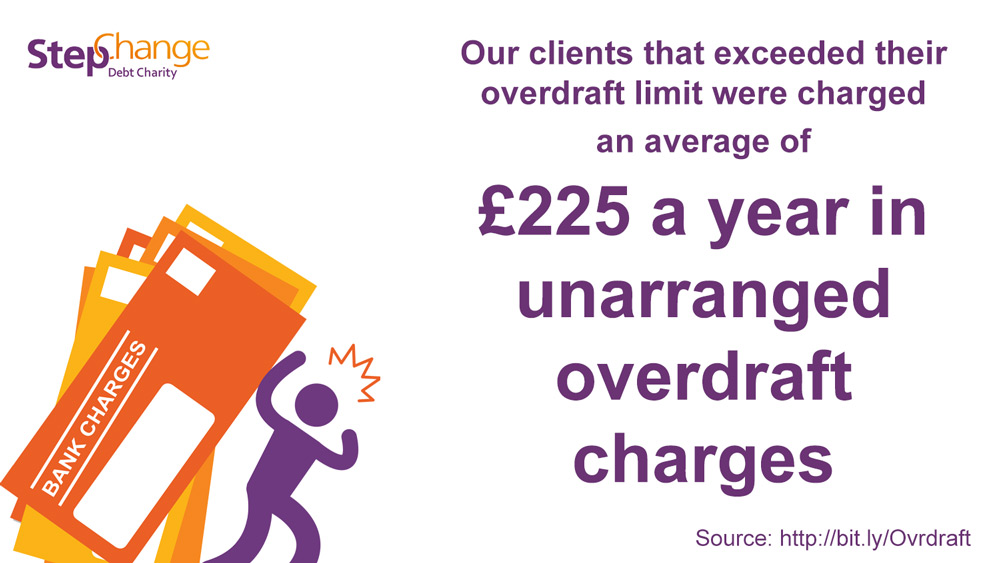How much is your overdraft costing you?
Do you know how much your bank charges if you go into your overdraft or if you go over your limit? Many of our clients pay hundreds of pounds to their bank as a result of unarranged overdraft charges. In some cases it can be more expensive to go into unarranged overdraft than it would cost to take out a payday loan.
We’ve carried out research that shows that overdraft charges are adding to the debt worries of our clients and the costs of having an overdraft might be higher than you’d expect. We believe that the FCA should take action to limit unarranged overdraft charges.
The true cost of your bank account
Many people are trapped in a monthly cycle of dipping in and out of the red regularly using their overdraft to meet essential costs. We found in a recent survey of callers to our debt helpline that clients with an overdraft facility were used their overdraft in 11 out of the last 12 months.
We think that unarranged overdraft charges are too high and they disproportionately affect those that are least able to pay. The cost for exceeding their overdraft limit averaged £45 when all the charges were added up. It doesn’t usually stop at one set of charges though, and people typically went over their limit in five months of the previous year.
By doing some quick maths you can see that people contacting us for debt advice are paying an average of £225 a year in bank charges for exceeding their overdraft limit.

Overdraft charges: a slippery slope
Our research shows that overdrafts can add extra pressure to those struggling with debt. The ability to spend more than you have can seem useful at first, but it can quickly get out of control.
Here’s a typical lifecycle of an overdraft problem:
- You’re short of money towards the end of the month, so you go into your overdraft (below the limit agreed with your bank) to cover you until payday. You repay the overdraft in full when you’re paid but this leads to having a lower balance in your account
- Every month you’re spending slightly more than you’ve got available, so you increase the overdraft to cover the difference
- Eventually you find that your overdraft is the size of your monthly income. So rather than filling your account with money every payday, it means you’re just repaying your overdraft and building the debt back up
- There comes a point where you can no longer extend your overdraft and instead you go over the limit to cover essential costs like food and household bills. Charges are added to your account, which makes it harder still to get back into credit
- Banks have the ability to withdraw an overdraft facility at any time. This is most likely to happen if you’re regularly going over your limit, leaving you without money available
How to deal with overdraft debt
Overdrafts can be difficult to deal with, and once you’ve reached your overdraft limit it can be very hard to pay it back. If you’re finding that you’re stuck in an overdraft it may be worth following these steps in an effort to repay it:
- Change banks: Get a basic account with a bank you don’t owe any debt with, so you know they won’t take any of your money to repay debts (known as setting off)
- Work out a monthly budget: Relying on an overdraft to support you is a potential sign of money problems. Create an income and expenditure budget to see if your income and your outgoings add up
- Set up a regular payment: If your budget shows that you can cover all your living expenses and have money left over to pay towards your debts then you can set up a regular payment based on what you can afford. Repaying the debt as soon as possible is a good way to reduce interest costs, but make sure it’s affordable too
- Seek debt advice: If your budget doesn’t add up and there isn’t enough money to easily repay the overdraft it’s likely you’ll benefit from debt advice. We can help you understand your options and guide you through the best way to deal with your debts, including your overdraft
If you have overdraft debts that you’re struggling to deal with then you should contact us for free and impartial debt advice.
It’s time for the FCA to set a cap on unarranged overdraft charges. Our research reveals the impact of overdraft charges on the vulnerable.
Tags debt lawfcaoverdraft
Related Posts
You’ve probably heard about the mis-selling of payment protection insurance (PPI) and...
Read more
While we offer help with debt, the British Heart foundation and WeQuit.co.uk...
Read more
There’s a great way to keep fashionable and save your pennies at...
Read more